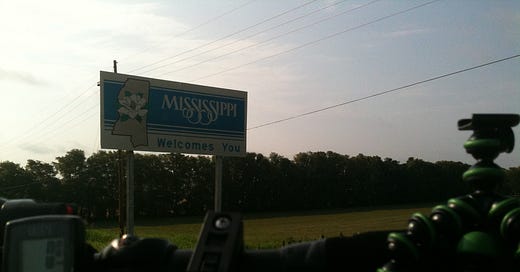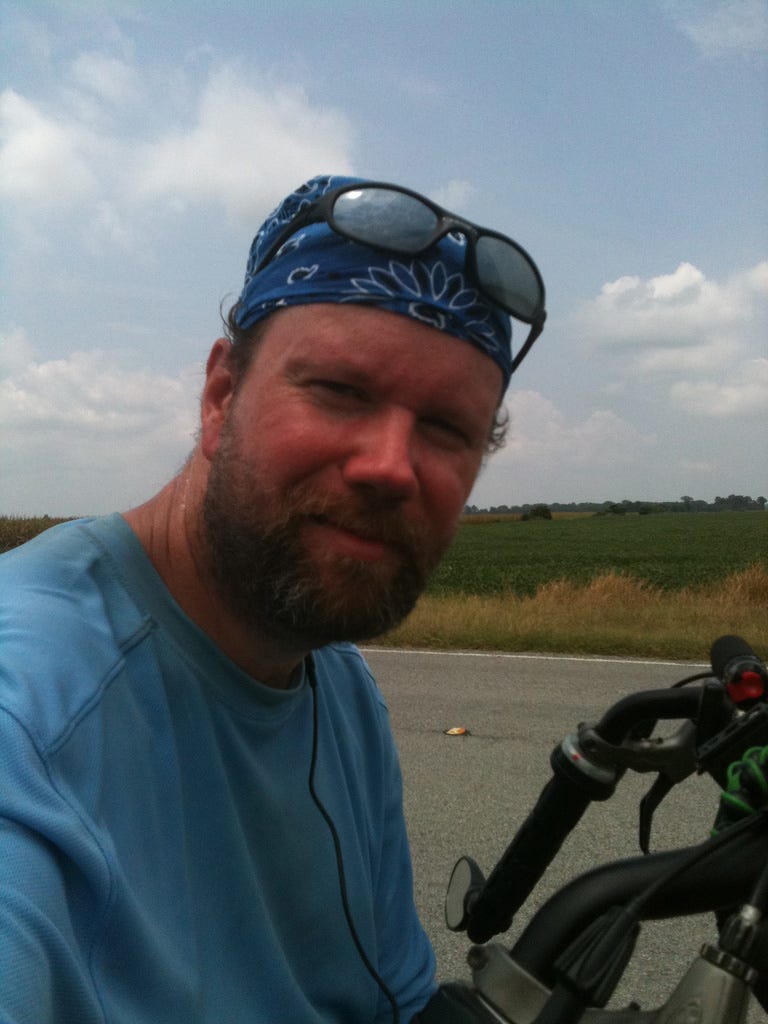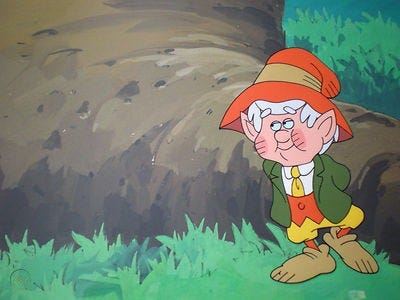Greetings folks. A few articles of business first:
If you’re attached to the continuing story of my Gambian friend Patrick Mendy, I’ve decided that there’s just too much to say about this situation and I think the best path forward is a book proposal. So I have a ream of paper and a fountain pen at the ready. At the moment he’s well and has benefitted greatly from all of the help y’all have given him. If there’s any major news I’ll let you know, and if you have specific questions or concerns just email me.
This fortnight’s piece concerns my 2011 bicycle trip from the headwaters to the mouth of the Mississippi. I’ve written previously about this trip in Volume I, though knowledge of that piece is not a prerequisite for reading this one, nor will it be on the exam.
Additionally you will find below my thoughts on the first halfway decent episode of Star Trek, the original series. I’m starting to regret my choice of subject matter because the simple fact is this was a bad show, and there are only so many ways to say so. But I’m holding out hope that there must be something redeeming about it, otherwise what’s all the hubbub, right? Well the tenth episode, “The Corbomite Maneuver” glints with a little light.
Finally, the elves in the Red Clay Bestiary store are hard at work producing the first of a series of bestiary shirts, starring one of my favorite authors, Kurt Vonnegut. Sadly the elves spent the holiday weekend watching movies (they tell me The Last Duel is not as bad as it ought to be given the ludicrous cast and the director’s penchant for grotesque self-indulgence) and they won’t be meeting the Tuesday deadline, but keep an eye on this space and it will be forthcoming in a matter of days.
Mississippi on the Mississippi
They call it the Great River Road but there’s nothing especially great about it. It’s a good bet though if you’re on a bike and you want to get where it’s going without getting run over, if only because not many people drive these stunted back roads. But from that snail’s perspective, it’s a hot, grubby existence, filled with cheap, dingy motels or nights spent inside a stifling tent in a nest of sweaty clothes, grimy tools, bags of food, crumpled maps, and half a dozen bottles of warm Gatorade or possibly urine—one can’t tell which in the dark.
Three weeks of this peripatetic existence brought me to the border of Mississippi, heralded with the same understated white on green Highway Gothic as the previous nine crossings (thrice between Illinois and Missouri). Except in this case the crossing took place on a long, narrow two-lane bridge with a tractor-trailer rumbling directly behind me, pedaling like my ass was on fire. But wait—just on the other side of the bridge in the shimmering heat stood a man, legs akimbo, arm outstretched, a bottle of water in his hand like he was there to encourage Maurice Garin on to his 1903 Tour de France victory.
Not gonna lie, this was awesome. But it also set up a conundrum: would I stop and talk, or would I simply grab the bottle in the spirit in which it was offered and ride off into the sunset, or into at least off into an unchanging vista of blacktop and cornfields.1 There was a purity to the latter, in which I would complete his joke and we would both tell the story of our brief and precise connection by the side of US-49 until our kids grew weary of it, at which point we’d tell it again.
Obviously that’s what I chose to do. No word passed between us—I merely snatched the bottle, ice cold, and held it aloft in a gesture of thanks.
It was the first of many strange encounters I had with people in Mississippi. There’s something about this state which fascinates me—there’s not one city worthy of the term; indeed the entire population is barely half that of metropolitan Atlanta. It’s beautiful but stark—flat as a lake and relentlessly hot in summer. It’s crisscrossed with decrepit highways such as the one I was now on, most of them empty for hours at a time. On my blue recumbent with my PVC trailer I must have stood out like a turd in a punchbowl.
Approaching Greenville on my second day a woman in nursing scrubs pulled up next to me in a dusty burgundy Cutlass. She reached over and manually cranked down the passenger-side window, her eyes only vaguely on the road, a maneuver that didn’t exactly fill me with peace as we rolled along at twenty miles per hour a mere foot from one another. With her face crimped into an expression of deep concern she yelled at me over the engine and the wind, “Are you alright?!”
I was never clear as to what this was all about, though admittedly the heat index touched 115 degrees that day and here I was, alone on the side of a desolate highway maybe an hour before dusk. I yelled back that I was fine. “Okay,” she replied, “I’ll check back with you later!” And off she went, never to be seen again.
Perhaps she came back later, but she probably didn’t anticipate that I would stop at the very first motel I came to when I reached Greenville, a gloomy little box sandwiched between rent-to-own furniture stores and dreary beauty shops with sun-bleached images of architecturally implausible hairstyles in the windows. There was a McDonalds around the corner but the thought of eating a grease bomb was deeply unsettling after a day spent in an outdoor sauna. I traipsed off into the inky night in search of something, anything else. The street was lined with low seedy buildings but most were unlit, except for a liquor store on the other side, and as I walked the inchoate figure of a tall man loomed out of the darkness from its direction and growled a warning that may have been a threat, “You gonna get stabbed white boy.”
Jesus. Back to McDonalds.
The next day the road gave way to a gravel track running atop a long series of levies. This was broken at regular intervals of perhaps five hundred yards by cattle guards. If you don’t know what a cattle guard is, imagine a grid of steel bars perhaps fifteen feet wide running perpendicular to the road with the bars spaced about eight inches apart and a pit beneath. The spacing prevents cattle from walking on them, but they’re also not great for bicycles. The first time I tried to ride over them it felt like putting my mouth around the business end of a jackhammer, so after that I would dismount and walk gingerly across the obstacles, which seemed to have been designed expressly to break ankles. It was a long, tedious process, but there were virtually no cars, and so I was able to dispense with the heat and discomfort of my helmet for most of the day. I instead wrapped a bandana around my head for protection from the sun.
In the late afternoon, after picking my way laboriously across dozens of the guards and trundling roughly over miles of gravel, I spotted a car parked some distance ahead. It was my father-in-law, Jon, who I’d planned to meet in Vicksburg that evening. He’d grown impatient and driven out to meet me. This was a godsend. I loaded the bike on a rack on the back of the car and we drove the remaining twenty or so miles to the city Ulysses Grant had striven for months to reach some 150-odd years earlier. I’m not sure which of us had had it worse.
In the space of half an hour I went from the dust and and scorching heat and humidity, the ceaseless vibration of tires across the rough gravel, and the tedious repetition of the cattle guards to standing in a gigantic room filled with pulsing lights and blaring music and green baize tables and zombies parked in front of slot machines, pumping money into the slots like monkeys trying to get food rewards. Jon had booked us a room at a riverboat casino and hotel. Mississippi, I recall thinking, was truly a study in contrasts.
I showered and put on the freshest clothes I had and we went to the buffet, where I filled my plate so many times the staff probably thought I was smuggling it to a family of Haitian refugees. The food was very, very rich but varied and reasonably good, though I was burning so many calories that I would have happily eaten casino chips. I didn’t, but I managed to waste a pile of them anyway. I’d never been to a casino before and Jon thought I should give roulette a shot. He bought eighty dollars worth and gave me half.
I was self-conscious because the bandana had left a horizontal tan line across my forehead. Paired with my rumpled clothes I looked a bit ridiculous, but the croupier was friendly and was interested to hear of my adventures. I had to tell my story quickly because my stack of chips disappeared like a rat down a pipe. Jon meanwhile managed to somehow increase his stack, so when we left the table I’d cost him about twenty dollars, net. We called it a night and I slept the sleep of the dead.
My last day in Mississippi I left my gear with Jon and rode the Natchez Trace to meet him again in Natchez. It was a beautiful ride; the best since probably Iowa. The Trace is an old footpath that 18th and 19th century traders used to return to Nashville after floating a raft of furs or meat or iPhones downriver to Natchez. In the 1930s the Civilian Conservation Corps converted it to a parkway, and for the price of a little extra time you can enjoy a leisurely drive along the 440 miles between the two cities. Most people, though, are more interested in the destination than the trip, so the parkway is largely devoid of cars. I spent a good portion of the day making S shapes across the full width of the road and looking up at the trees that arched overhead, secure in the knowledge that there was nothing in front of me to hit or be hit by.
Early the next morning I left Jon and crossed into Louisiana. The last few days of the trip would turn out to be a series of breakdowns and equipment failures until with a flat tire and no more patches I finally called a halt in the rain outside a derelict church forty miles from New Orleans. I had a melancholy sense, crossing that last bridge at Natchez, that my precious month of living outside the bounds and daily demands of the civilized world was drawing to a close, and the fog that lay upon the river on either side lent a premonitory melancholy that would grow in the days and nights yet to come, until that eternal present of life on a bike passed silently into eternal past.
The Corbomite Maneuver
I’ve watched and written on ten hours of Star Trek so far and I can honestly say that this program, which I will admit I loved as a kid, is just terrible. Objectively terrible, like Guinea worms or Windows Me. So how did it ever survive?
Well I have a theory. The initial run of Star Trek comprised all of three seasons—79 episodes. Just enough, apparently, to be sufficient for syndication. Syndication, see, relied on stripping, wherein the syndicating television station would simply pick a time slot in their schedule and just fill it all the way across, Monday through Friday, with whatever trash happened to be available, which, after 1969, included Star Trek.
During the early 1970s the show was often programmed in the mid-afternoon, at a time when the only people watching TV were drunken soap opera aficionados and kids just home from school—my generation, as it happens. It arrived at a time when a young person craving science and science fiction didn’t have much to meet that interest. We mostly missed the moon landings, and Star Wars, which isn’t science fiction anyway, didn’t come along until 1977. So Star Trek had a prefab audience and not much in the way of competition. Ipso fatso.
It’s still terrible though. Mostly. Episode ten, “The Corbomite Maneuver” is uneven but contains some redeeming elements. The story concerns an encounter with a massive spacecraft that looks like a big disco ball and has the power to fry the Enterprise into a cinder at will. Kirk and company are informed directly that that is what will happen, and they are given ten minutes to make peace with the deity of choice. Spock notes that they have no moves remaining and that, as in chess, checkmate is final and without appeal. Kirk suggests they choose a different game—poker.
He goes on to bluff the alien craft, warning them that the Enterprise carries a device which reflects hostile energy back at the sender, thus ensuring that the destruction of the ship will result in the destruction of the attacker. It’s the kind of sorry bluff that won’t trick an eight-year old but Shatner plays it pretty well, and for once we see a resolution that turns on something we can actually appreciate rather than someone’s superhuman will or some technical mumbo jumbo that could have been written with a dictionary and a food processor.
Bonus points to whomever chose to cast Clint Howard, the then seven-year old brother of director/actor Ron Howard, as the alien ship commander, overdubbed by the voice of Ernie the Keebler Elf, Walter Edmiston. The effect of the adult voice emerging from Howard’s face decorated with Leonid Brezhnev eyebrows, is more deeply weird than all of the mangled foreheads that signified “alien” in the later editions of the franchise.
Unfortunately “Corbomite” loses points for an extended shirtless Kirk scene—in which his chest appears to have been oiled by some unfortunate production assistant—and a scene featuring Kirk being grotesquely sexist about thatched human punching bag Yeoman Rand:
KIRK: When I find the headquarters genius that assigned me a female yeoman... MCCOY: What's the matter, Jim. Don't you trust yourself? KIRK: I've already got a female to worry about. Her name's the Enterprise.
My God, this show.
King Cotton has long ago vacated Mississippi if not the whole of the South, to be replaced with the Golden Dauphin. I stopped in one field to steal an ear of corn but apparently it’s mostly grown for ethanol or cattle feed and tastes like cardboard.









After reading Infinite Jest I became so self belittled as a hack writer that I decided there was no novel in me yet. I relish the idea of a book. You share more than a bandanna with D Foster Wallace.
To this day, my brother and I still make references to Tranya.
https://www.youtube.com/watch?v=0O-wsehlRHg